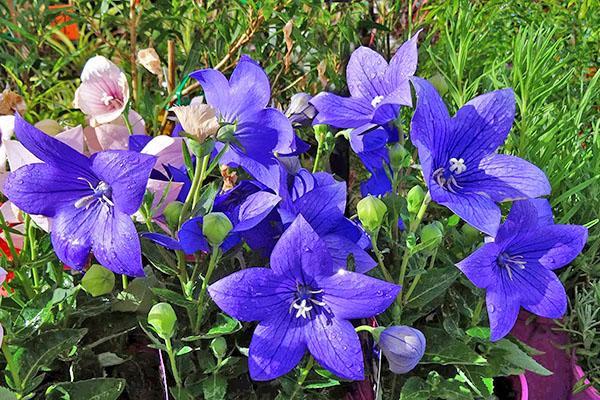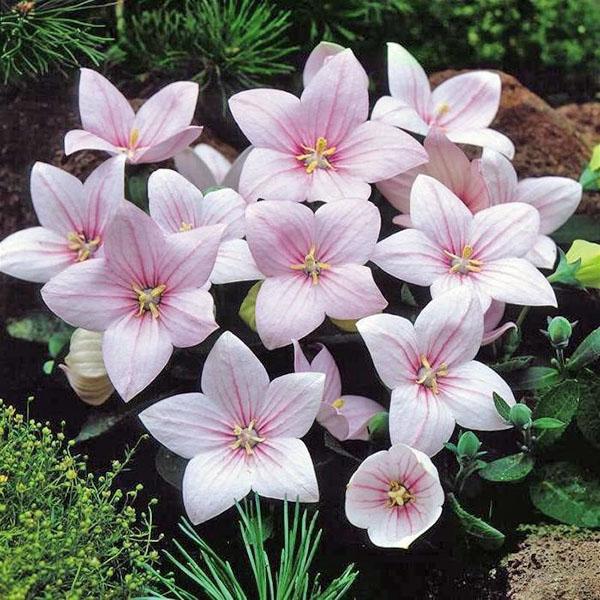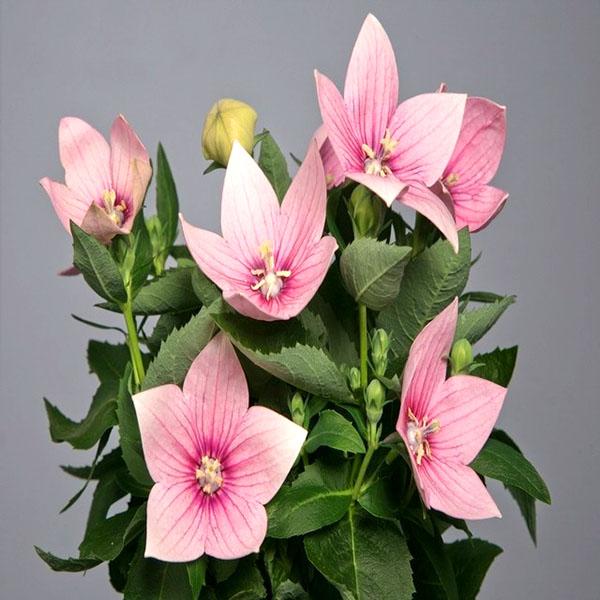Growing Platicodon begins with good seed selection
 If you follow all the prescribed rules for caring for the plant, and they are not at all complicated, then growing Platicodon will bring pleasure. The flower will delight its owners for a long time with very beautiful buds and lush foliage.
If you follow all the prescribed rules for caring for the plant, and they are not at all complicated, then growing Platicodon will bring pleasure. The flower will delight its owners for a long time with very beautiful buds and lush foliage.
Platycodon: description of the plant, main species

The most popular types and varieties of plants:
- platycodon astra pink;

- platycodone pink variety;

- terry platycodon;

- large-flowered platycodon;

- platycodon blue lake.

The culture is distinguished by a fleshy root, not thick shoots, which are densely covered with leaves. Adult representatives reach 80 cm in height. The leaves are ovoid or elongated, with an edge of small denticles. The lowest plates form a rosette at the very root.
Both leaves and shoots are green with a bluish tint. Flowers are single bells, or compact inflorescences, which consist of 3 or 5 buds. When loose, they reach 7-8 cm in diameter. The color is deep blue. Each petal has a pronounced mesh of the smallest veins of a dark shade.
Starting from the second decade of July, Platycodon opens its buds. Its flowering lasts 1.5 months, after which the fruit-boxes, shaped like an egg, are formed. Seeds are flat, oval, glossy.
On flower beds, Platicodon is good to combine with various types of bells, low phlox, gypsophila.
Growing Platicodone from seeds at home
 Some gardeners sow Platicodon directly into open ground both before winter and with the onset of spring. But it is best to grow a flower by seedling method. For these purposes, seeds are planted from the second decade of February to the end of March.
Some gardeners sow Platicodon directly into open ground both before winter and with the onset of spring. But it is best to grow a flower by seedling method. For these purposes, seeds are planted from the second decade of February to the end of March.
Presowing seed treatment
 For better germination, the seeds are pre-soaked. You need to make a bag of gauze, place the grains in it and lower it into a container of water. In 48 hours, the planting material will be ready for use.
For better germination, the seeds are pre-soaked. You need to make a bag of gauze, place the grains in it and lower it into a container of water. In 48 hours, the planting material will be ready for use.
Soil and container for receiving seedlings
 It is best to use a purchased substrate for planting. The best option is a universal soil for flowering plant species. You can also prepare the soil yourself. To do this, you need to take the same amount of peat, humus and river sand, mix well. Any containers are suitable: boxes made of plastic or wooden containers for seedlings.
It is best to use a purchased substrate for planting. The best option is a universal soil for flowering plant species. You can also prepare the soil yourself. To do this, you need to take the same amount of peat, humus and river sand, mix well. Any containers are suitable: boxes made of plastic or wooden containers for seedlings.
For growing seedlings, it is better to use wide and deep flowerpots.
Sowing platycodon for seedlings
 To grow shirokokolokolchik seedlings, it is necessary to deepen the grains by no more than 0.5 cm, sprinkling them with river sand on top. You can also spread the planting material on the soil surface.
To grow shirokokolokolchik seedlings, it is necessary to deepen the grains by no more than 0.5 cm, sprinkling them with river sand on top. You can also spread the planting material on the soil surface.
Platycodon seedling care
 After planting the seeds, the soil is sprayed with water. Liquid temperature should be around 200 From degrees. In the process of growing seedlings, the moisture content of the earthen coma must be constantly monitored. The top layer should not be too wet and dry.For quick germination, the pots are covered with foil, kept at a temperature from +20 to +240 C. After 2 weeks, the first shoots appear.
After planting the seeds, the soil is sprayed with water. Liquid temperature should be around 200 From degrees. In the process of growing seedlings, the moisture content of the earthen coma must be constantly monitored. The top layer should not be too wet and dry.For quick germination, the pots are covered with foil, kept at a temperature from +20 to +240 C. After 2 weeks, the first shoots appear.
After the germination of the grains, the "greenhouse" is removed, and the temperature of the content is slightly lowered - to +18 - +200 C. After the formation of 4 leaves, the platycodon seedlings are dived into small containers with a diameter of 1-1.5 cm. They are transplanted into open ground after the night frosts have passed outside.
Propagation of platycodon by cuttings
 Platycodon can be grown using cuttings and dividing the bush. But this is not the best option, since they do not always take root. If the cuttings, although rarely, take root, then in most cases there are no cuttings.
Platycodon can be grown using cuttings and dividing the bush. But this is not the best option, since they do not always take root. If the cuttings, although rarely, take root, then in most cases there are no cuttings.
If you decide to grow platycodon from a cutting, then you need to cut the planting material in such a way that they have from 2 to 3 internodes. Root the twigs in wet sand or a glass of water. A week later, they are planted in a pot for the final formation of the root system.
Growing Platicodone in a pot
 A beautiful flower is grown not only in open flower beds, but also on windowsills in ordinary flowerpots. Keep the flower at a temperature of about +200 C. The best place are windows that face the west or east side.
A beautiful flower is grown not only in open flower beds, but also on windowsills in ordinary flowerpots. Keep the flower at a temperature of about +200 C. The best place are windows that face the west or east side.
If a flowerpot with a flower is on the south window, then in the hot period of the day it is shaded.
The bells are removed immediately after wilting. This will allow new buds to form faster. In a pot, platycodone reacts poorly to waterlogging, high humidity. It is watered moderately, once a week in winter. In this case, the room temperature should be from +12 - +150 C, not higher.
When buds begin to form, the flower is fed mineral fertilizers... Use drugs according to the instructions on the package.
As for the transplant, adult specimens change the soil once every two years, and young ones every 12 months.
Platicodon planting and care in the open field
 Grains are sown in open ground in the second decade of May or at the end of June. It is at this time that the seeds will quickly germinate, and the sprouts will rapidly increase in size.
Grains are sown in open ground in the second decade of May or at the end of June. It is at this time that the seeds will quickly germinate, and the sprouts will rapidly increase in size.
Choosing a landing site
 Shirokokolokolchik loves to grow in areas with a lot of light. But it can also be planted in partial shade. The main thing is that the groundwater does not pass close to the site and excessive moisture does not collect, otherwise the plant will begin to hurt and lose its attractiveness. The soil should be loose, rich in nutrients. For platycodon, you can safely choose loam with a share of sand. The acidity of the earth is neutral.
Shirokokolokolchik loves to grow in areas with a lot of light. But it can also be planted in partial shade. The main thing is that the groundwater does not pass close to the site and excessive moisture does not collect, otherwise the plant will begin to hurt and lose its attractiveness. The soil should be loose, rich in nutrients. For platycodon, you can safely choose loam with a share of sand. The acidity of the earth is neutral.
Before planting flowers, the beds are dug up, adding 110-130 g of ash and mineral fertilizers (1 tbsp. L. Per 1 m2).
Planting seedlings on the site
To plant seedlings in a flower bed, you need to prepare the holes. They should be slightly larger than plant pots. The seedlings are abundantly moistened, freed from the flowerpot and, together with an earthen lump, are placed in holes, which are also pre-watered. Then the rhizome is sprinkled with soil and lightly tamped.
The specifics of caring for Platicodon on the site
 Shikorokolokolchik needs proper care. Observing simple rules, the flower will become a real decoration of the flower bed and the entire summer cottage.
Shikorokolokolchik needs proper care. Observing simple rules, the flower will become a real decoration of the flower bed and the entire summer cottage.
Watering, weeding and loosening the soil. During the first two weeks after transplanting the plant into the beds, the seedlings are watered daily. Gradually, the frequency of watering is reduced, brought to 2 times in 7 days. After moistening, the soil is loosened, the emerging weeds are removed.
Top dressing and mulching of row spacings. To spend less time weeding the ground, you can cover up the space between the rows of the bell. For these purposes, peat, humus or hay are used.
 Every 30 days, Platycodon is fed with special complex mixtures for flowering crops. Tall specimens are tied to supports.So that the flower does not stretch too much, it is periodically watered with means that restrain growth. For these purposes, a drug called "Athlete" is perfect.
Every 30 days, Platycodon is fed with special complex mixtures for flowering crops. Tall specimens are tied to supports.So that the flower does not stretch too much, it is periodically watered with means that restrain growth. For these purposes, a drug called "Athlete" is perfect.
To give the plant a beautiful appearance, it is recommended to pinch the upper shoots.
Pruning platycodon. The flower stretches quite strongly during the growing season. To form a neater bush, its tops are regularly pinched throughout the year. The second way to prevent stem deformation is to remove them. Do this with those branches that are too thin and long.
Platikodon wintering. The root system of this beautiful shirokolokolchik is very fragile, so it is recommended to change the place in the flower bed if absolutely necessary. After the plant has faded, the seeds are collected. This is done in late autumn, but on a sunny day. For wintering, the stems of the bell are cut off. And the remaining trunk and the space around it are sprinkled with leaves or humus mulch. As soon as spring comes, the shelter is removed.
In order to grow Platicodon from seeds at home to bring the desired result, you must adhere to the above rules and recommendations. Thus, it will turn out to decorate both the room and the flower bed with incredibly beautiful flowers.